“Days” is a fitting title, because this series is a tale as old as time – as long as sports manga time, anyway.
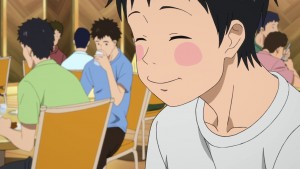 Uda Kounosuke should be quite comfortable directing a character like Tsukamoto Tsukichi, because he’s definitely Tireless Terrier Mark III – and Uda-sensei was the one who delivered Mark I, Outa Shou in Ginga e Kickoff (Sakamichi Onoda is sandwiched in-between them). Of course this is a template that’s much older than any of these characters – one of the classic setups in sports manga. There’s a reason it’s as timeless as it is, because if this sort of hero story is brought off well, it can be extremely effective as both drama and comedy.
Uda Kounosuke should be quite comfortable directing a character like Tsukamoto Tsukichi, because he’s definitely Tireless Terrier Mark III – and Uda-sensei was the one who delivered Mark I, Outa Shou in Ginga e Kickoff (Sakamichi Onoda is sandwiched in-between them). Of course this is a template that’s much older than any of these characters – one of the classic setups in sports manga. There’s a reason it’s as timeless as it is, because if this sort of hero story is brought off well, it can be extremely effective as both drama and comedy.
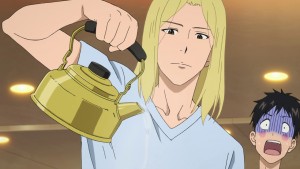 Why are characters like Tsukichi so popular in sports manga? Well, archetypes like Honda Gorou are Kitamura Kou are too – and I certainly love those characters. But the average person (be they a schoolboy – or girl – or a nostalgic adult) is a lot more likely to be like Shou or Tsukichi. Most of us are not supremely gifted athletes (like Kazama in Days is), but all of us have at least the potential to be so dedicated, hard-working and stubborn that we achieve athletic success anyway. Most of us won’t, of course, and guys like Shou and Onoda definitely have a unique talent as well as work ethic. But as long as there are kids like Tsukichi, the dream is alive.
Why are characters like Tsukichi so popular in sports manga? Well, archetypes like Honda Gorou are Kitamura Kou are too – and I certainly love those characters. But the average person (be they a schoolboy – or girl – or a nostalgic adult) is a lot more likely to be like Shou or Tsukichi. Most of us are not supremely gifted athletes (like Kazama in Days is), but all of us have at least the potential to be so dedicated, hard-working and stubborn that we achieve athletic success anyway. Most of us won’t, of course, and guys like Shou and Onoda definitely have a unique talent as well as work ethic. But as long as there are kids like Tsukichi, the dream is alive.
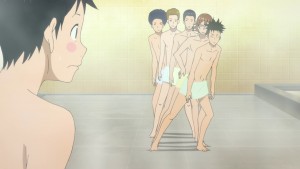 It’s tempting to see Days as strictly Tsukichi-kun’s story, and he’s certainly the most important character. But in truth it’s both his story and Kazama’s, and the contrast between them is a central theme. It’s interesting that we rarely see Kazama at practice or participating in any drills, and clearly those of his fellows who are less gifted resent it while at the same time admiring his confidence and skill. There have been some run-ins with coaches and suspensions too, it seems, and Kazama’s relationship with the game seems to have become rather indifferent. It’s only when Tsukichi wakes in the middle of the night to pee and sees Kazama practicing by himself that we get a sense that Kazama still has a love for this sport – the problem is that he only feels it when he’s by himself on the field. Until now that is…
It’s tempting to see Days as strictly Tsukichi-kun’s story, and he’s certainly the most important character. But in truth it’s both his story and Kazama’s, and the contrast between them is a central theme. It’s interesting that we rarely see Kazama at practice or participating in any drills, and clearly those of his fellows who are less gifted resent it while at the same time admiring his confidence and skill. There have been some run-ins with coaches and suspensions too, it seems, and Kazama’s relationship with the game seems to have become rather indifferent. It’s only when Tsukichi wakes in the middle of the night to pee and sees Kazama practicing by himself that we get a sense that Kazama still has a love for this sport – the problem is that he only feels it when he’s by himself on the field. Until now that is…
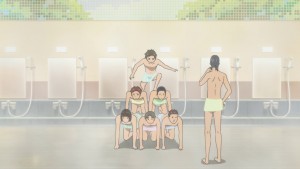 When Seiseki lines up for a scrimmage against a rival team, Kazama is nowhere on the pitch even though the coach has elected to field a team exclusively of first-years. Tsukichi has already at this point endured another spate of verbal abuse from rival teams (and a rather mortifying bath incident regarding growth curves), and his on-field performance predictably starts out in disastrous fashion. But he has an “a-ha” moment soon after the opening whistle, one that countless tireless terriers across many sports have had over the decades – “At this point, all I can do is run.” And that’s just it – even if you can do nothing else well on the field or the rink or the court, you can always at least run, if you’re pushed yourself hard enough in preparation. You can always be a target, be an annoyance, be an obstacle – you can be involved if you run. You can make an impact.
When Seiseki lines up for a scrimmage against a rival team, Kazama is nowhere on the pitch even though the coach has elected to field a team exclusively of first-years. Tsukichi has already at this point endured another spate of verbal abuse from rival teams (and a rather mortifying bath incident regarding growth curves), and his on-field performance predictably starts out in disastrous fashion. But he has an “a-ha” moment soon after the opening whistle, one that countless tireless terriers across many sports have had over the decades – “At this point, all I can do is run.” And that’s just it – even if you can do nothing else well on the field or the rink or the court, you can always at least run, if you’re pushed yourself hard enough in preparation. You can always be a target, be an annoyance, be an obstacle – you can be involved if you run. You can make an impact.
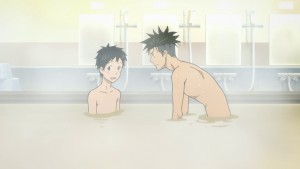 Indeed, the coach has warned his first-years before the game “Don’t try and be elegant. Just worry about winning.” Tsukichi’s fellow first-year Kurusu (Yoshino Hiroyuki) (who’s sort of taken Tsukichi gruffly under his wing) has always dreamed of playing stylish, graceful football – of playing like Kazama, in other words. But as the minutes pass and it becomes clear that the opponent simply can’t run with the Seiseki boys, the truth is apparent – in the end, you just have to score more goals than the other team, whether they’re pretty or not.
Indeed, the coach has warned his first-years before the game “Don’t try and be elegant. Just worry about winning.” Tsukichi’s fellow first-year Kurusu (Yoshino Hiroyuki) (who’s sort of taken Tsukichi gruffly under his wing) has always dreamed of playing stylish, graceful football – of playing like Kazama, in other words. But as the minutes pass and it becomes clear that the opponent simply can’t run with the Seiseki boys, the truth is apparent – in the end, you just have to score more goals than the other team, whether they’re pretty or not.
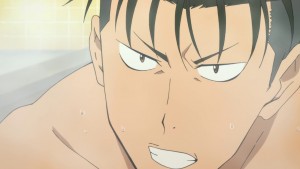 The final part of the episode brings us our first extended interaction between Mizuki and Tsukichi, who asks him to show him how to “kick the ball hard” (ah, the simplest of football desires). Mizuki, as it happens, was the worst player on the team when he joined as a first year – all he had was his stamina and his stubbornness. He’s a much more natural mentor for Tsukichi than Kazama is in that sense, and while he’s terrible with explanations – “Boof! Not ker-pow!” – he does reveal an infectious joy when he’s finally able to secretly get back on the field and kick the ball around. Like Shou and Onoda before him, Tsukichi seems to have the ability to connect his teammates with the joy of their chosen sport – and that’s a pretty important talent in and of itself.
The final part of the episode brings us our first extended interaction between Mizuki and Tsukichi, who asks him to show him how to “kick the ball hard” (ah, the simplest of football desires). Mizuki, as it happens, was the worst player on the team when he joined as a first year – all he had was his stamina and his stubbornness. He’s a much more natural mentor for Tsukichi than Kazama is in that sense, and while he’s terrible with explanations – “Boof! Not ker-pow!” – he does reveal an infectious joy when he’s finally able to secretly get back on the field and kick the ball around. Like Shou and Onoda before him, Tsukichi seems to have the ability to connect his teammates with the joy of their chosen sport – and that’s a pretty important talent in and of itself.


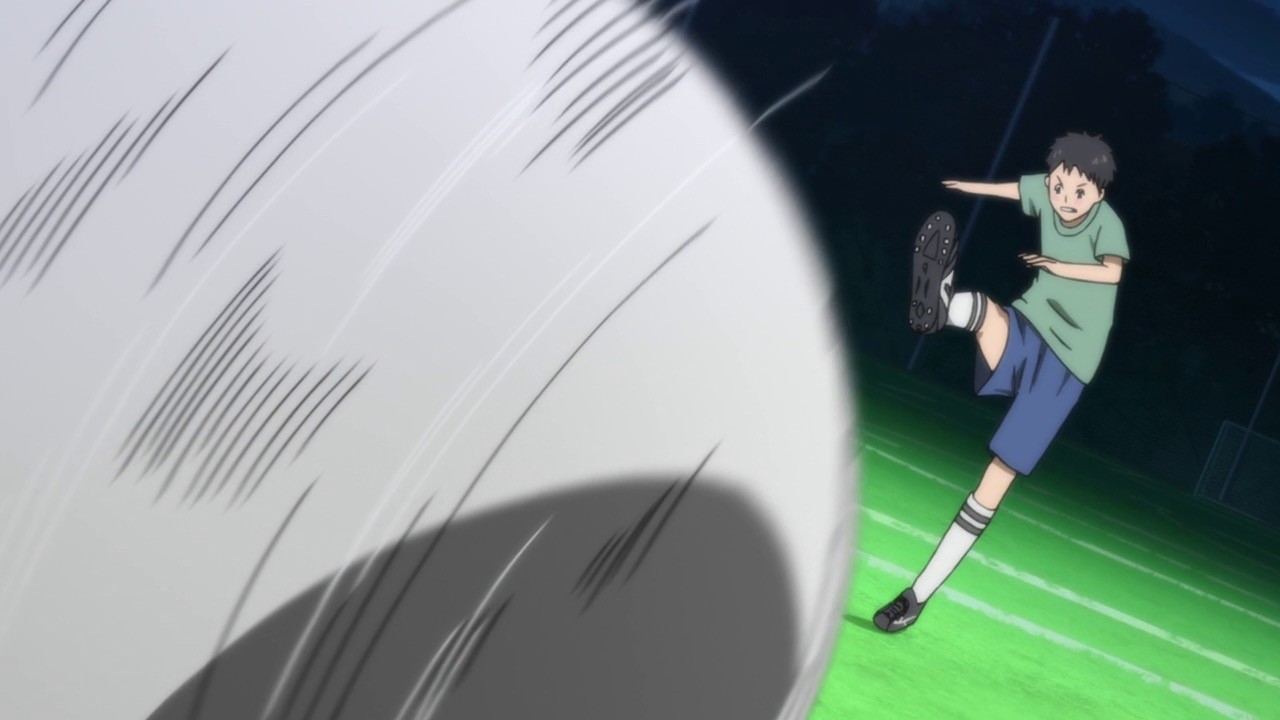
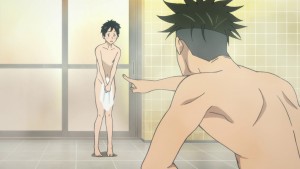

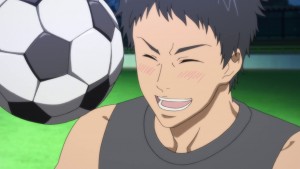
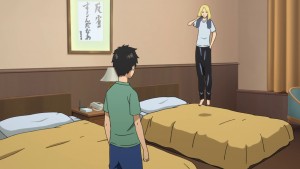
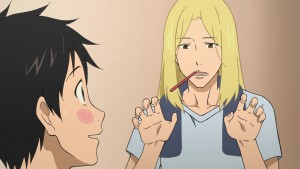
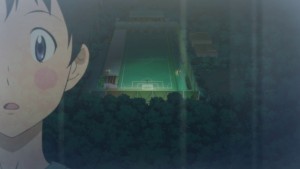
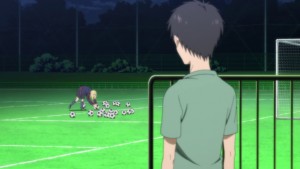
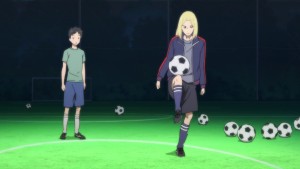
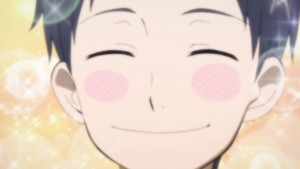
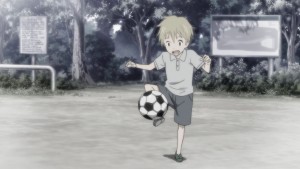
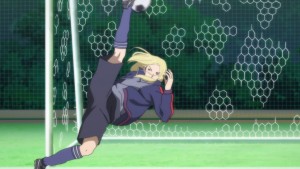
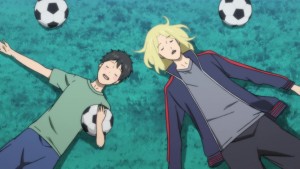
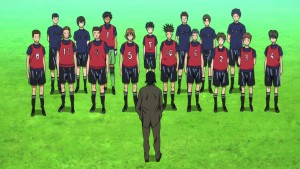
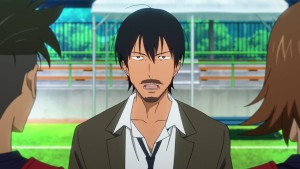
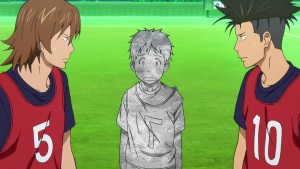
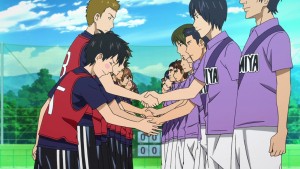
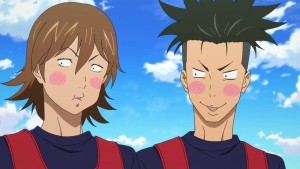
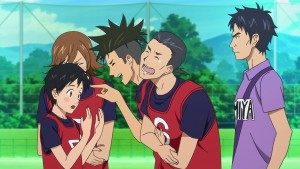
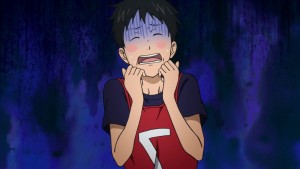
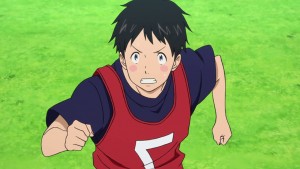
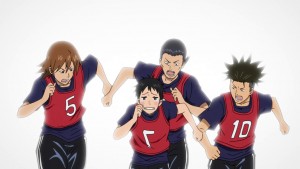
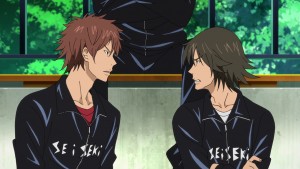
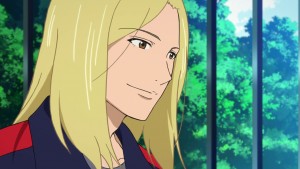
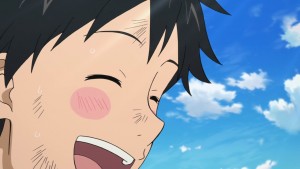
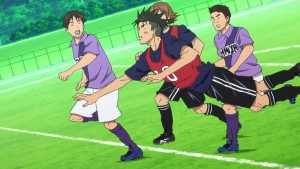
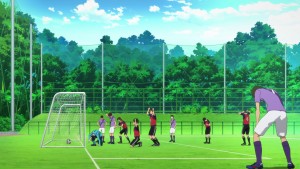
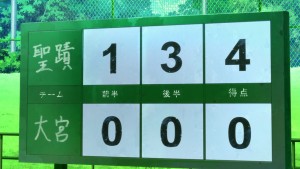
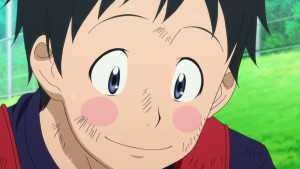
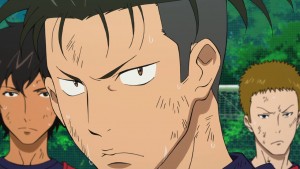
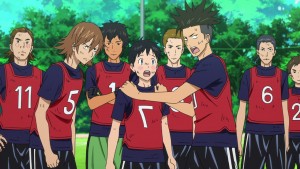
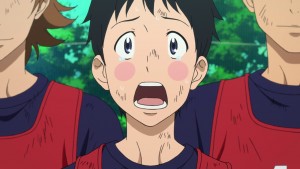
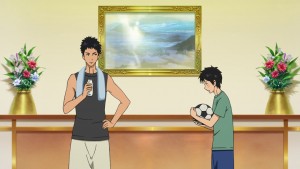
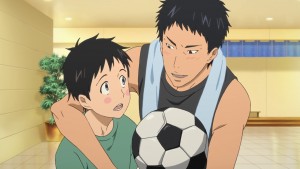
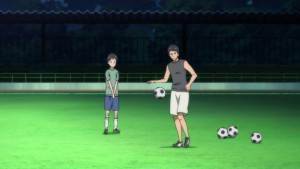
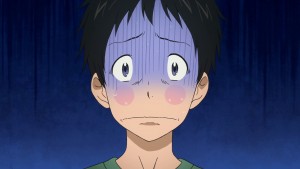
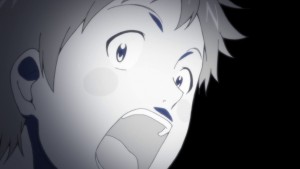
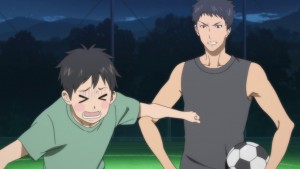
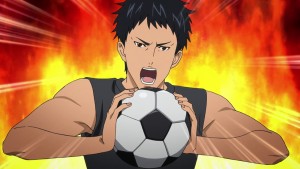

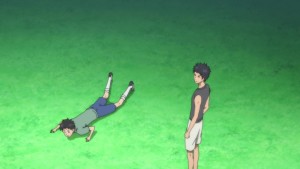
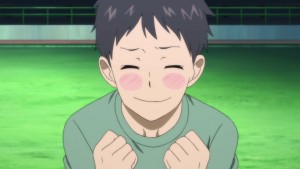
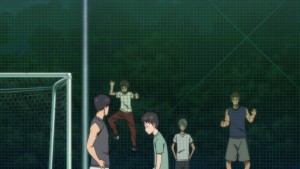
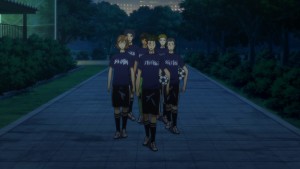
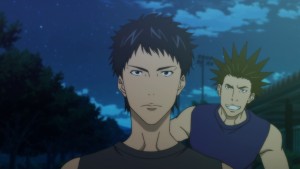
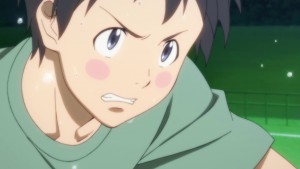
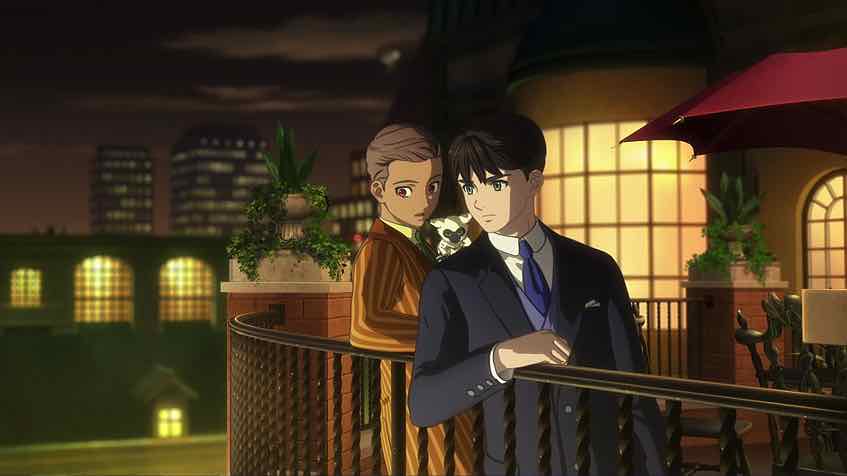
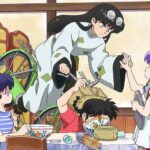
owler
July 18, 2016 at 12:40 amIs it me, or is his 7 backwards? Everybody else’s numbers seem to be correct….
Guardian Enzo
July 18, 2016 at 8:12 amHeh – now that you reminded me I remember thinking that for a second during the episode too, but then I forgot all about it. Plot point or sloppy Q.C.?
Stöt
July 18, 2016 at 4:32 pmHas to be a plot point. It’s backwards in every shot.
Earthling Zing
July 19, 2016 at 8:35 amTsukichi probably just wore it inside out